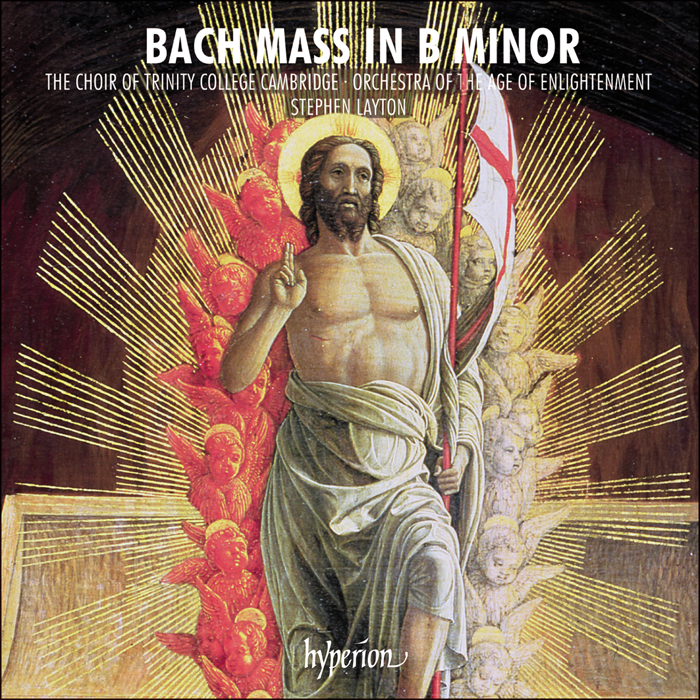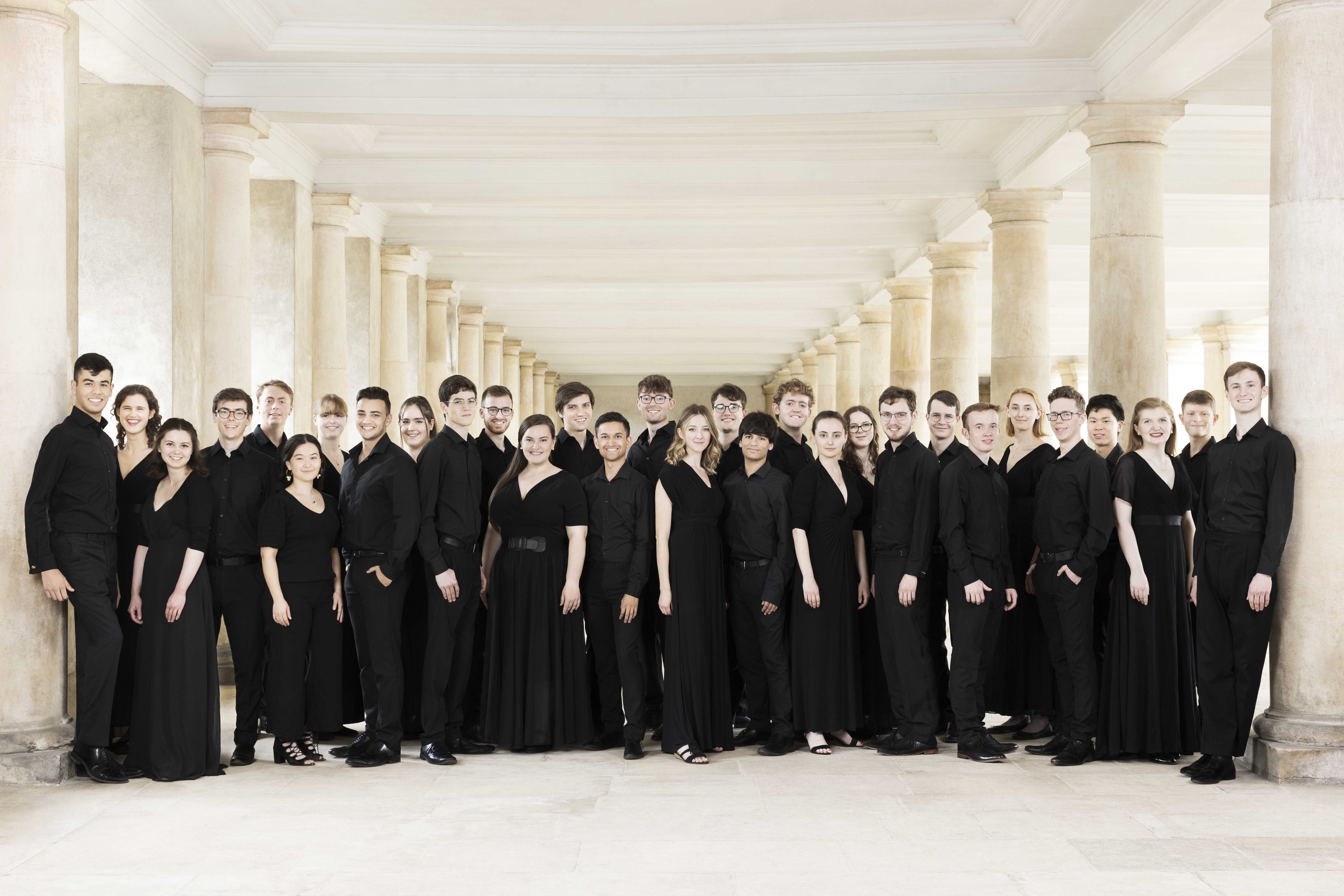Bach - Mass in B Minor
> See recording details...As I listened to this excellent new recording of the B minor Mass I found myself reflecting on the progress that we have witnessed in recent years. When I first started to listen seriously to the choral music of Bach, some 35 years ago at least, a commercial recording of the mighty B minor Mass by a student choir would have been an unlikely proposition. Furthermore, despite the excellent work that was being done by the likes of the English Baroque Soloists, at that time one couldn’t take for granted that a period instrument ensemble would play Bach with polish and sensitivity. Yet now, here we have a student choir giving an account of the Mass that can hold its head up high alongside the strongest competition and they are aided and abetted by superb playing from the Orchestra of the Age of Enlightenment.
But perhaps the greatest testimony to the quality of the Trinity choir is that no less than three of the five soloists – Katherine Watson, Helen Charlston and Gwilym Bowen – are former Trinity choral scholars who have all now embarked on solo careers. And let’s be clear: there’s no question of nepotism here; all three justify their inclusion on merit.
I remember hearing Helen Charlston featuring as a soloist on a Trinity disc of music by Ēriks Ešenvalds. That was when she was still a student at the college and she impressed me then (review). Here she has a more substantial role, albeit in just one section of the Mass. She and Katherine Watson make a fine job of the ‘Christe eleison’, their well-matched voices blending extremely well. Both singers deliver Bach’s music with pleasing tone and no little agility.
Since Helen Charlston’s singing gives such pleasure in the ‘Christe’ it’s a pity that Bach gave his soprano II nothing else to do in the Mass. However, we do get other chances to hear Katherine Watson. I particularly liked her account of ‘Laudamus te’. Her delivery of this aria is stylish; the tone is winning and she negotiates the ornamented line with aplomb, investing the music with just the right degree of expressiveness along the way. Later, she also partners Gwilym Bowen most attractively in the ‘Domine Deus’. Here, the pair’s enjoyably airy singing is complemented most delightfully by the flute of Lisa Beznosiuk.
Gwilym Bowen’s family is steeped in music: In particular, I think I’m right in saying that he is the grandson of the distinguished tenor, Kenneth Bowen. As I said, he makes a fine job of his duet with the soprano. The tenor’s other assignment is the ‘Benedictus’. Here, I relished Bowen’s nicely plangent tone which also has underlying strength. This is very accomplished singing and once again Lisa Beznosiuk is on hand to contribute a lovely rendition of the other-worldly flute obbligato.
The other two soloists are further advanced in their careers and better known. Neal Davies impresses in ‘Quoniam tu solus sanctus’ where despite the fact that he has a large voice he negotiates Bach’s challengingly ornamented vocal line very well indeed. He’s heard to even better advantage in ‘Et in Spiritum Sanctum’ where he offers fine, even legato. The sound of the oboi d’amore are the perfect foil to his voice. Iestyn Davies excels in ‘Qui sedes’, his voice mellifluous and his phrasing exemplary. This aria, too, features an oboe d’amore – just one this time – and Katharina Sprekelsen’s fluent playing is a delight. If anything, Davies is finer still in the intense music of the ‘Agnus Dei’. He sings this aria with poise and fine expression, making it a special experience, as it should be.
So, the soloists all acquit themselves very well – and so does the choir. Trinity is, I think, one of the larger collegiate ensembles; here they number 43 singers (13/9/10/11). They’re accustomed, of course, to tackling challenging music, including a lot of music of our own time, but there’s a case to be made that nothing challenges singers as comprehensively as Bach does. Every test that these young singers face in the B minor Mass is passed with flying colours.
They set out their stall with an imposing opening to the ‘Kyrie’ and then the body of the movement, well paced by Stephen Layton, unfolds patiently. They make the start of the ‘Gloria’ a properly joyful experience for the listener and they’re equally exciting in comparable passages such as the exhilarating ‘Cum Sancto Spiritu’. In that movement they sing the fugal music very nimbly. So high is the general standard of choral singing these days that we’re inclined to take such precision and unanimity for granted but it requires studious preparation and excellent musicianship to achieve results like this. The choir sounds fresh and majestic in the ‘Sanctus’.
They’re no less impressive in the more subdued episodes. The singers – and the players too – achieve real inwardness and mystery at ‘Et incarnatus est’. That mood carries over into the ‘Crucifixus’. In both of these sections the singing is expertly controlled yet this is no mere technical accomplishment; there’s just the right amount of expressiveness too. After all this subdued singing you really feel we’ve earned the explosion of joy at ‘Et resurrexit’. All in all, this performance is a significant achievement for Stephen Layton’s fine choir.
Inevitably, perhaps, the spotlight falls mostly on the singers in a performance of the B minor Mass. However, it’s right to acknowledge that the playing of the Orchestra of the Age of Enlightenment makes a very significant contribution to the success of this enterprise. The playing is unfailingly stylish and without exception the obbligatos are a delight to the ear. Stephen Layton brings everything together expertly. I thought his tempo selections consistently felt ‘right’. His preparation of the choir has clearly been scrupulous and detailed yet, just as significantly, he has imbued them with the spirit of the music so that the joy and the profundity of Bach’s music comes across in equal measure. The catalogue contains many fine versions of the B minor Mass, several of which I have had the pleasure of reviewing for MusicWeb International. This is one of the freshest and most enjoyable versions to have come my way for quite some time.
It remains only to say that the recording itself is very good indeed, as you might expect since it was in the experienced hands of engineer David Hinitt and producer Adrian Peacock. Richard Wigmore contributes a fine booklet essay.
John Quinn

Hyperion Records CDA68181/2
